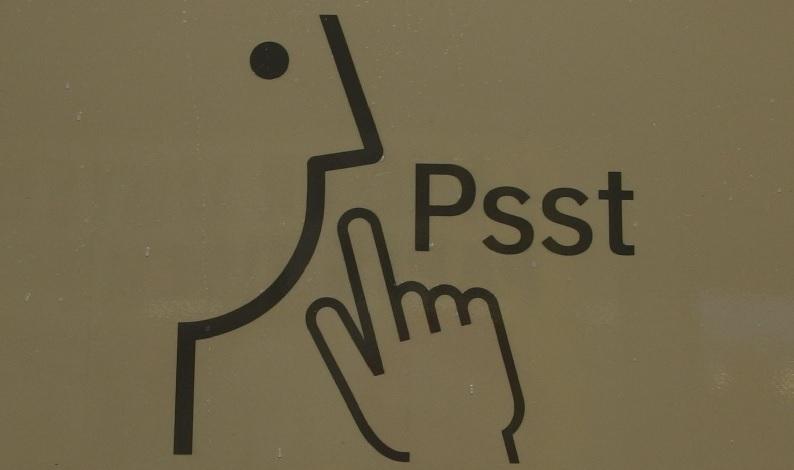The silences of the Australian election
Posted By Graeme Dobell on May 13, 2019 @ 06:00
Election campaigns involve loud argument and quiet consensus—and then there are the silences.
Silences point to hard stuff just offstage: no-go, too dangerous.
For political parties, breaking the silence introduces complexity that tends towards tangled nuance, toppling into dilemmas and hard choices. There be conundrums and nightmares.
Risk-averse parties embrace silences, invoking on-message discipline. Don’t scare or confuse voters. The corollary is that parties don’t want to declare and decide.
In this federal election campaign, international issues show how consensus fades quickly to silence. The biggies are the dragon conundrum, the Uncle Sam nightmare, the international unravelling, and a solo mime—the government’s silent scream on climate change.
While much of Australia loudly argues the dragon-slayer-versus-panda-hugger puzzle, the parties tip-toe around the dragon in the room.
After the fifth icy [1] age [2] with China, the Coalition and Labor don’t want to slip on the ice again.
Enter the ever-vivid Paul Keating, never one for silence.
The former prime minister delivered a mighty swipe [3], calling for dragon slayers to be banished: ‘When the security agencies are running foreign policy, the nutters are in charge’, Keating told the ABC. ‘You’d clean them out. You’d clean them out.’
Labor disavowed [4] Keating, pledging no Canberra purge [5].
The no-purge-no-nutters-here promise should mean that Labor, if victorious, won’t axe Home Affairs secretary Mike Pezzullo. The ABC’s Andrew Greene makes that point in an astute piece [6] which had a sharp Canberra quote from a ‘senior official’ on the security threats facing a Shorten government: ‘The three Bs are the biggest threats to Bill Shorten once he’s in office; boats, bombs, and bytes.’
Add Beijing to that B list. The panda pressures push and pull.
Neither side can play the usual reset card of ‘new government, new day’. There’s no going back to the future with China, as Shadow Foreign Minister Penny Wong [7] notes: ‘It is not simply a matter of a “diplomatic reset.” Fundamentally, we are in a new phase in the relationship.’
Wong says the ‘complex and consequential’ panda pressures will persist and could get harder. Amen. Her answer is an uneasy balance: ‘First, we don’t pre-emptively frame China only as a threat. Second, we must be grounded in the realities.’
Amen, as far as it goes. You can see why the parties prefer panda silence during the campaign.
On the other side of Saturday’s vote, though, loud moments of truth await. Not least, as Michael Shoebridge [8] writes, is identifying the ‘sophisticated state actor’ that hacked into the Australian parliament’s information system and the networks of the Labor, Liberal and National parties.
US President Donald Trump, meanwhile, offers the mirror reverse of the dragon conundrum. Australia loves the alliance but fears Uncle Sam’s economic intent.
In the trade war, Australia wants Beijing to give enough for Trump to claim victory and declare peace. But Australia detests Trump’s protectionist, trade-bloc vision—all about America’s might, not what’s right.
A striking silence—both in policy and in politics—is the collapse of any sense of principle in Australian trade policy.
Once, Australia had standing as an intellectual and practical force in the World Trade Organization and its predecessor, the General Agreement on Tariffs and Trade. In the 1980s and 1990s, as a significant player in international trade, Australia created and led the Cairns Group [9]. Today, the Cairns Group is limping, not loud.
Australia’s only interest in talking to Trump has been as a small target, seeking exemption from US tariffs. Australia should be mounting loud protests and principled arguments against Trump as he hacks at the WTO and the rules that have made the world better and richer.
That bring us to the international unravelling. As former intelligence chief and wise owl Allan Gyngell [10] put it, ‘[T]he order we have known for the past seventy years has ended. It’s not being challenged. It’s not changing. It’s over.’
The ‘unravelling’ view sees the constant fretting about the ‘rules-based order’ in the 2016 defence white paper [11] and the 2017 foreign policy white paper [12] as a lament for the recently departed.
The unravelling hasn’t featured in the campaign or the leaders’ debates. But it’ll be the central motif of the incoming government briefs from the defence and foreign affairs departments. Drawing on DFAT’s description of international trends in last month’s budget document [13], the concerns will range from rising nationalism and geopolitical competition to anti-globalisation and protectionist sentiments, along with a shift in power in the Indo-Pacific ‘without precedent in Australia’s modern history’ and wider trends such as climate change and urbanisation.
Top of defence’s brief will be: ‘The first priority [14] is to manage great power competition in the Indo-Pacific.’
The silent scream of the campaign has been the Coalition’s inability to say anything about the megatrend that’s the top issue for many voters: climate change.
The Coalition has been screaming at itself for so long it’s lost its voice.
Climate was the policy issue that twice toppled Malcolm Turnbull, once as opposition leader, then as prime minister. Labor adopted Turnbull’s energy policy, so the Coalition can only argue about cost, not detail or intent or the size of the problem.
The silences last till Saturday. And then …
Article printed from The Strategist: https://aspistrategist.ru
URL to article: /the-silences-of-the-australian-election/
URLs in this post:
[1] icy: /big-chill-china-australia/
[2] age: /cold-winds-fifth-china-oz-icy-age/
[3] mighty swipe: https://www.theaustralian.com.au/nation/politics/nutters-are-in-charge-of-security-agencies-paul-keating/news-story/5118333dc1031db8dc162db78941494e
[4] disavowed: https://www.abc.net.au/news/2019-05-06/federal-election-bill-shorten-disagrees-with-paul-keating-china/11082144
[5] Canberra purge: https://thenewdaily.com.au/news/national/2019/05/06/paul-keating-security-outburst/
[6] astute piece: https://www.abc.net.au/news/2019-05-10/election-keating-comments-might-save-home-affairs-pezzullo/11098440
[7] Penny Wong: https://www.lowyinstitute.org/publications/australian-values-australia-s-interests-foreign-policy-under-shorten-labor-government
[8] Michael Shoebridge: /attributing-the-hack-on-australias-parliament-will-give-clarity-to-the-china-relationship/
[9] Cairns Group: https://cairnsgroup.org/pages/default.aspx
[10] Allan Gyngell: https://rusi.org/event/gallipoli-memorial-lecture-fear-abandonment-australia%E2%80%99s-response-changing-global-orders
[11] 2016 defence white paper: http://www.defence.gov.au/WhitePaper/
[12] 2017 foreign policy white paper: https://www.fpwhitepaper.gov.au/
[13] budget document: https://dfat.gov.au/about-us/corporate/portfolio-budget-statements/Documents/2019-20-foreign-affairs-and-trade-pbs.pdf
[14] first priority: https://www.minister.defence.gov.au/minister/cpyne/speeches/address-australian-financial-review-national-security-intelligence-summit
Click here to print.
